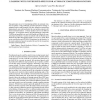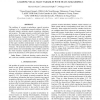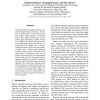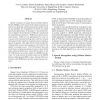177 search results - page 4 / 36 » Learning Models for English Speech Recognition |
ICASSP
2010
IEEE
13 years 7 months ago
2010
IEEE
Data sparseness is an ever dominating problem in automatic emotion recognition. Using artificially generated speech for training or adapting models could potentially ease this: t...
ICASSP
2011
IEEE
12 years 11 months ago
2011
IEEE
The problem of acoustic-to-articulatory speech inversion continues to be a challenging research problem which significantly impacts automatic speech recognition robustness and ac...
EMNLP
2010
13 years 5 months ago
2010
This paper examines tagging models for spontaneous English speech transcripts. We analyze the performance of state-of-the-art tagging models, either generative or discriminative, ...
LREC
2008
13 years 9 months ago
2008
ProPOSEL is a prototype prosody and PoS (part-of-speech) English lexicon for Language Engineering, derived from the following language resources: the computer-usable dictionary CU...
ICPR
2006
IEEE
14 years 8 months ago
2006
IEEE
Speech recognition is usually based on Hidden Markov Models (HMMs), which represent the temporal dynamics of speech very efficiently, and Gaussian mixture models, which do non-opt...




